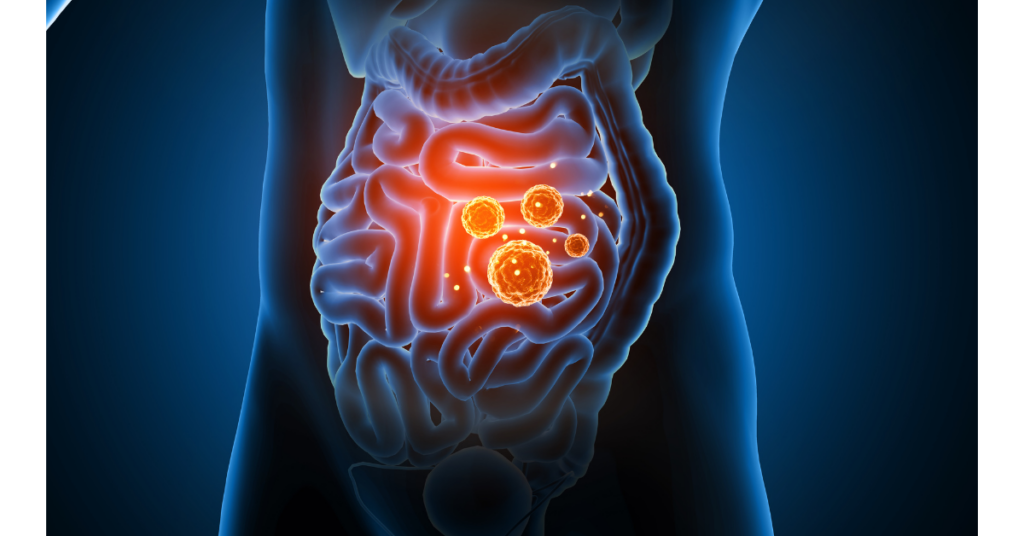What is Leaky Gut Syndrome?
In a healthy gastrointestinal tract, only properly digested food can pass through the gut wall. However, if this wall has been damaged, big spaces can develop between the cells of the gut, allowing larger (partially digested) food particles, toxins and bacteria to pass through into the bloodstream.
The body doesn’t recognise these invaders and automatically sets up an immune response, leading to inflammation, which in turn can cause auto-immune diseases such as arthritis, asthma, lupus, chronic fatigue syndrome, and fibromyalgia, as well as a propensity towards food allergies. This condition is known as leaky gut syndrome.
Signs and Symptoms
Food allergies due to the presence of large partially digested food particles in the bloodstream.
Multiple nutrient deficiencies due to damage to the proteins whose job it is to transport minerals across the gut wall.
Confusion, memory loss, brain fog, and headaches due to toxic overload of the liver caused by excessive amounts of bacteria, parasites, and fungi in the bloodstream.
Fatigue, gas, and bloating due to poor absorption of food and nutrients caused by chronic inflammation of the gut.
(See also our articles on Irritable Bowel Syndrome (IBS), Constipation and Diarrhoea)
Causes
Antibiotics due to the fact that they lead to an overgrowth of abnormal flora in the gastrointestinal tract (bacteria, parasites, candida, and fungi). For example, candida overgrowths can literally put down ‘roots’ in the lining of the intestines, allowing comparatively large gaps to develop in the gut wall.
Alcohol and caffeine as strong gut irritants.
Foods and drinks contaminated by bacteria (Helicobacter pylori, Klebsiella, Pseudomonas, etc.), parasites (Giardia lamblia, Cryptosporidium, Blastocystis hominis, etc.) and moulds / fungal mycotoxins.
Enzyme deficiencies (e.g., coeliac disease, lactase deficiency causing lactose intolerance).
NSAIDS (non-steroidal anti-inflammatory drugs) such as ASA, Ibuprofen and Indomethacin are strong gut irritants. (Although they relieve the symptoms of inflammation elsewhere in the body, NSAIDS also interfere with prostaglandin production, thus affecting the gastrointestinal mucus and leading to acid and enzymatic attacks on the gut wall.
Prescription corticosteroids (e.g., Prednisone).
Birth control pills.
A highly refined carbohydrate diet (e.g., chocolate bars, cookies, cake, soft drinks, white bread) and excessive amounts of processed food.
Diagnosis
Laboratory tests for intestinal permeability, candida, food allergies, and levels of chymotrypsin (a digestive enzyme produced by the pancreas) can help establish whether leaky gut syndrome is at the root of a problem.
Treatments and Strategies
Leaky Gut Syndrome still remains a largely unrecognised phenomenon in conventional medical terms. Those forward-thinking doctors who do identify with it tend to advocate dietary changes and food supplements alongside their conventional medical approaches.
Drugs such as Nystatin, Nizoral, and Diflucan may be used if candida, one of the main causes of Leaky Gut, is particularly prolific.
Complementary Medical Treatment
The following information does not constitute a prescription or recommendation – this is included for your information only.
To successfully treat leaky gut syndrome, a combination of treatments need to be undertaken. For example, there is no point in treating candida with herbs without first changing the diet and avoiding any foods that may cause an allergic reaction.
Diet
Allergenic foods must be identified and eliminated. Common allergens include wheat, dairy, sugar, corn, soya, eggs, peanuts, oranges, chocolate, and fermented products.
Avoid foods that can further irritate the gut such as highly spiced products (curries, chillies, vinegar, pepper, mustard), alcohol, coffee, and fried foods.
Eat fresh vegetables and fruits; millet and rice.
Drink plenty of water to flush out the toxins.
Dietary supplements: Fructo oligo saccharide (FOS): A natural food substance with properties similar to fibre. Jerusalem artichokes and dandelions are particularly rich in FOS. It has been shown to help heal the gut wall by encouraging the growth of beneficial bacteria.
Butyric acid (as serine butyrate), Vitamin U, deglycyrrhizinated licorice extract (DGL), N-acetyl glucosamine (NAG), zinc ascorbate, magnesium ascorbate, and vitamin A can also help to rebuild the intestinal membrane.
Gamma-linolenic acid (GLA) used as an anti-inflammatory.
Grapeseed extract and oregano oil can help to clear candida overgrowth.
Acidophilus, Bifido bacteria, and casein can help repopulate the gut with friendly bacteria.
Calcium, magnesium, B complex and vitamins B and C can help to calm an overactive nervous system thus relieving stress.
Herbal Medicine
Kava kava (piper methysticum), passiflora, valerian, cramp bark, and black haw help to calm the nerves and relax the body.
Echinacea (a natural antibiotic) can help build up a depleted immune system.
Physical Strategies
Bodywork such as chiropractic treatment, massage, shiatsu, and acupuncture can help to improve circulation, relieve stress, and release toxins.
Yoga, tai chi, or qigong can help to build and repair the body, calm the mind, and connect us to our higher spiritual potential.
Affirmations, self-help tapes, books, counselling, meditation, and psychotherapy can all help to change one’s outlook on life and in doing so help the body to heal itself.


